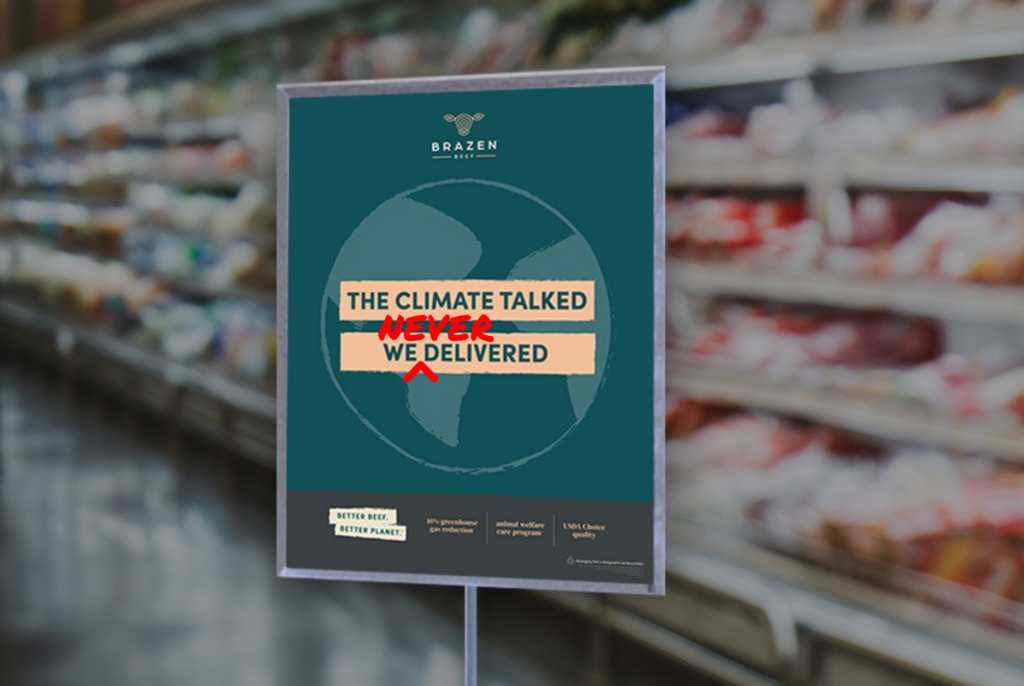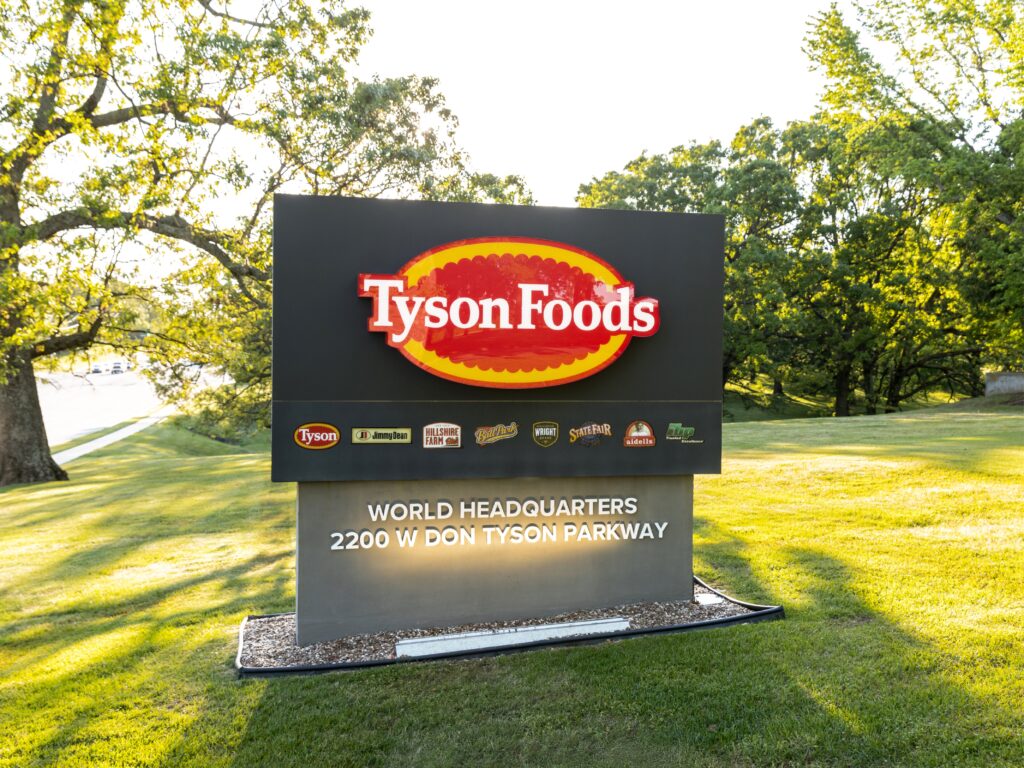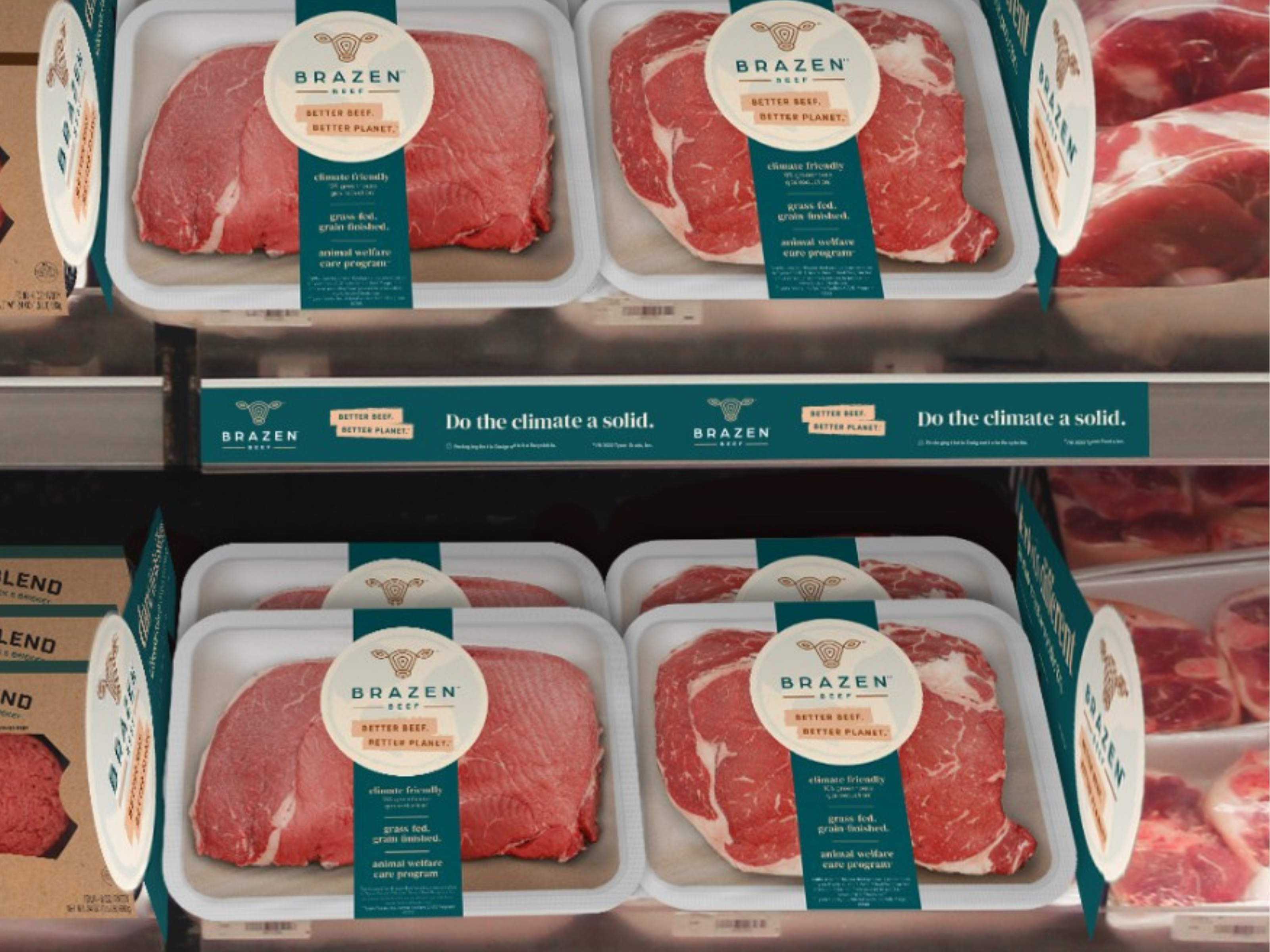5 Mins Read
US meat giant Tyson Foods has been sued by an environmental group for misleading consumers about the sustainability credentials of its “climate-smart” Brazen Beef.
Tyson Foods, America’s largest beef producer, is being accused of “deceptive marketing” and making false claims to consumers in a greenwashing lawsuit.
The complaint, filed by the Environmental Working Group (EWG) last week in the DC Superior Court, relates to the company’s claim that its operations will reach net-zero emissions by 2050, and its marketing of a beef product it says is “climate-smart”.
The plaintiff argues that the meat company – which produces a fifth of all beef, pork and chicken in the US – has no proven way of reducing emissions at its “current enormous scale of production” and the measures that would be required to offset its emissions are “unfathomable and unavailable”.
“Consumers are increasingly making purchasing decisions with their climate footprint in mind. Tyson is exploiting this trend by making outrageous and unsubstantiated claims about its sustainability efforts that simply don’t hold up under scrutiny,” EWG said in a joint statement with representing groups Animal Legal Defense Fund, Earthjustice, Edelson PC, and FarmSTAND.
‘Climate-smart’ beef claims akin to ‘kid-friendly cigarettes’

Producing beef makes up 85% of Tyson Foods’ emissions, according to a 2022 study by the Institute for Agriculture and Trade Policy. Its total emissions are greater than those of Austria or Greece, EWG noted.
To curb its impact on the environment, Tyson Foods has had its emissions targets validated by the Science-Based Targets initiative (SBTi). But the watchdog has only verified its plans for cuts made by 2030, and it has so far not approved any of the meat producer’s net-zero goals.
The lawsuit alleges that Tyson Foods has never tried to fully measure its emissions or made any detailed inventory publicly available. It adds that the company has omitted key polluting sources from its greenhouse gas reporting, such as land use and land use change linked with grazing and animal feed.
“Our lawsuit aims to hold Tyson accountable for misleading consumers about the true nature of its products and their environmental costs,” the joint statement read. “A court order stopping Tyson’s harmful conduct would represent a turning point in the fight to hold the biggest, most powerful contributors to the climate crisis – across industries – accountable for greenwashing.”
In July 2023, Tyson Foods announced its Brazen Beef brand, calling it a product based on months of research as part of its Climate-Smart Beef Program. The ground beef featured the USDA’s controversial Low Carbon Beef label, suggesting that it had been produced using measures that resulted in a ‘10% greenhouse gas emissions reduction’.
However, there’s little to no information about how it achieved these reductions, the lawsuit points out. “Brazen Beef is not yet available for purchase anywhere in the United States. Nevertheless, Tyson continues to market its ‘Climate-Smart Beef’ program to consumers and never qualifies this marketing with a statement notifying consumers that it currently does not have a climate-smart beef product, which is a material omission,” it reads.
“Moreover, given the staggering climate footprint of Tyson’s beef, even if Tyson were to reduce emissions from a portion of its beef products by 10 or even 30 percent, it would still not be a ‘climate-smart’ choice for consumers, any more than reducing the tobacco content of cigarettes by 10 percent would render that product ‘kid-friendly’ or ‘healthier’,” the complaint adds.
Tyson Foods lawsuit comes amid US crackdown on greenwashing

In response, Tyson Foods has pointed to its “long history of sustainable practices that embrace good stewardship of our environmental resources”.
The meat producer has poured just under $50M towards measures to reduce greenhouse gas emissions. That may seem like a lot, but it is merely one-hundredth of its annual revenue, which crossed $53B in 2022. Research by the Changing Markets Foundation has found that Tyson Foods spends more than twice on marketing than its R&D projects.
The company’s investment arm, Tyson Ventures, was created with a $150M fund in 2016 to invest in alternative protein, food waste and novel tech companies. But in 2022 alone, it disbursed $283M on advertising, a sum 11 times larger than its venture fund when measured on an annual basis.
These efforts have worked. A survey from earlier this year showed that 95% of Americans would buy products labelled ‘climate-friendly’, and 66% would pay more for them. And Tyson Foods’ efforts managed to sway some of them, with 15% finding ‘climate-friendly’ as having a smaller climate footprint than conventional beef, pork, chicken, and even tofu.
“There was good theoretical reason to suspect that Brazen Beef’s labelling would not alleviate and might exacerbate misunderstanding of GHG emissions,” the researchers wrote. People believed that Brazen Beef’s emissions were lower than pork and conventional beef.
“These results suggest that people underestimate the GHG of climate-friendly, low-carbon, and Brazen Beef more than people underestimate the GHG of conventional beef – and this difference is statistically significant,” the study noted.
“Greenwashing claims are really targeting well-meaning consumers who want to do good with their money, who want to try to take some individual responsibility and purchase foods that are more climate-friendly,” said Carrie Apfel, an attorney for Earthjustice, per the Wall Street Journal. “If they’re being fed a lot of false or misleading statements, then they really can’t make an informed decision about where to spend their money.”
Tyson Foods, the beneficiary of over $250M in direct government subsidies, is the second major meat producer to face a legal challenge for greenwashing. Brazil’s JBS – the world’s largest meat company – was sued by New York Attorney General Letitia James for similarly misleading consumers about its 2040 net-zero goal, alleging that the meatpacker has profited from “fraudulent and illegal environmental marketing practices”.
The USDA, in spite of its Low Carbon Beef label, is stepping up its fight against greenwashing too. Last month, it updated its labelling guidelines in a bid to ensure claims like ‘climate-friendly’ and ‘humanely-raised’ on meat labels are backed up with evidence. While the guidance uses voluntary language (“strongly encourages”), those found to be in violation were warned of enforcement action.



